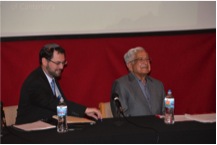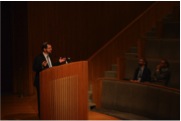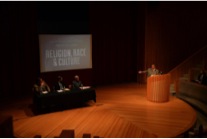On October 27, 2015, the Desmond Tutu Center for Peace, Reconciliation and Global Justice partnered with Butler University’s Center for Faith and Vocation to present the second installment of the seminar series, Religion, Race, & Culture. The seminar was held at 7:00 p.m. in the Shelton Auditorium at the Christian Theological Seminary, with two guests from Omaha, Nebraska, Dr. Syed Mohiuddin and Rabbi Josh Brown. The goal for this seminar was to discuss the relationship between Jews, Muslims, and Christians in the Omaha community, especially as it related to the Tri-Faith initiative. Both Dr. Mohiuddin and Rabbi Brown are founding members of the Tri-Faith Initiative, a unique community attempt towards reconciliation, building understanding, and promoting intercultural relationships between the three Abrahamic traditions.
Dr. Allan Boesak the Executive Director for the Desmond Tutu Center for Peace, Reconciliation, and Global Justice, and Dr. Brent Hege, Butler University Religion Professor and this year’s Director of the Religion, Race, & Culture seminar series, began the presentation by introducing the two guest speakers and explaining the objective and importance of the Tri-Faith Initiative. Dr. Syed Mohiuddin, Professor of Medicine at Creighton University’s School of Medicine and the founder and President of the American Muslim Institute, was the first guest speaker of the night. He began by explaining why he became one of the founding members and brought his Muslim congregation to be part of the Tri-Faith Initiative. Both Dr. Mohiuddin and Rabbi Brown focused on the similarities and shared backgrounds between Islam, Judaism, and Christianity- a reason why they believed the Tri-Faith Initiative would be such a success.
 First to speak, Dr. Mohiuddin described the inception, logistics, goals, and mission of the Tri-Faith Initiative. He and others in the Muslim community came together due to a shared belief that the Muslim population was being severely misrepresented and characterized through the violent acts of a small minority of Muslims. They felt an urgent need to change the cultural and political understanding of Islam and Muslims, especially as it related to American Muslims. The Institute, as a part of the Tri-Faith initiative, supports the research and study of Islam and its cultural variations, while sharing a campus with adherents of the Christian and Jewish faiths. They host talks, presentations, and workshops for schools and other institutions to encourage understanding and discourse. He Dr. Mohiuddin emphasizes that while the faiths have their own unique identities, they stand equal and together to face prejudices and bring people together religiously, culturally, and socially.
First to speak, Dr. Mohiuddin described the inception, logistics, goals, and mission of the Tri-Faith Initiative. He and others in the Muslim community came together due to a shared belief that the Muslim population was being severely misrepresented and characterized through the violent acts of a small minority of Muslims. They felt an urgent need to change the cultural and political understanding of Islam and Muslims, especially as it related to American Muslims. The Institute, as a part of the Tri-Faith initiative, supports the research and study of Islam and its cultural variations, while sharing a campus with adherents of the Christian and Jewish faiths. They host talks, presentations, and workshops for schools and other institutions to encourage understanding and discourse. He Dr. Mohiuddin emphasizes that while the faiths have their own unique identities, they stand equal and together to face prejudices and bring people together religiously, culturally, and socially.
Following Dr. Mohiuddin, Rabbi Brown argued that in fact, not much is new about the Tri-Faith Initiative. These faiths have been working together in many ways for many years. Its mission, however, is to reach further than ever before. He shared the story of a Rabbi, one who parted the changed the flow of the river simply by saying it needs to do so. He parted the sea for two men, one carrying items for a Passover feast, and the other an Arab traveller. Rabbi Brown used this story as a metaphor for how religious leaders, such as those involved in the Tri-Faith Initiative, can change the context of our current world, a seemingly impossible feat, like parting a river. He said, “In the context of our current world, we can call that miraculous.” Rabbi Brown believes that the fear-induced misunderstanding of Islam occurring in our nation and the global community is offensive. This mindset is the river, and the goal of the Tri-Faith Initiative is to change that flow, to change the context of our current world.
“God created space, our world, for companionship, but even since Cain and Abel, we have used it for hate. We must stop believing that we can’t stop this. The Tri-Faith Initiative believes that diverse people + space = justice, not hate. How can we change this?” -Rabbi Brown
The Tri-Faith initiative uses the Field of Dreams model—build it and they will come. It takes an approach to pluralism and diversity. The Tri-Faith Initiative has done this by hosting three houses of worships with a single central building to share speakers and ideas, creating a safe space for people together with unlimited potential. It is a good opportunity for Jewish and other religious communities because they learn more about themselves, their responsibilities, their limitations, and how they pray to God. The Tri-Faith Initiative is not trying to create a universal religion, rather they want to hear Muslim and Hebrew prayers, and Jesus’ name when it is appropriate, for instance. According to Rabbi Brown, our call-to-action, mine and yours, is to understand that our religious journeys are the core of our values, and one of our values is to protect the journey of our neighbor, equal to justice.
Following both of their speeches, Dr. Brent Hege opened up the floor for questions from the audience, many of which focused on the violent conflict in Israel and Palestine, and how Dr. Mohiuddin and Rabbi Brown are hoping to address these challenges within their own communities in Omaha. They also discussed the challenges that they both faced individually and within their own religious communities, and whether or not their congregations were susceptible to the ideas of the Tri-Faith Initiative.
By: Caroline Whang and Allison Troutner
The Religion, Race and Culture Seminar Series is presented by the Center For Faith and Vocation and Butler University and the Desmond Tutu Center.




